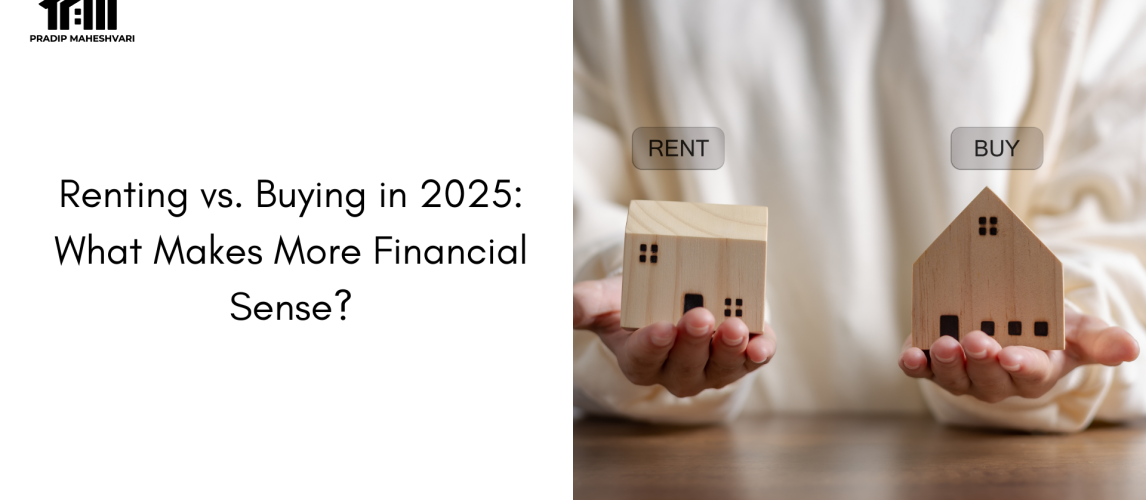Deciding whether to rent or buy a home has always been a major financial decision. But in 2025, the question carries even more weight. With higher interest rates, evolving lifestyle priorities, and regional shifts in real estate pricing, the answer isn’t one-size-fits-all.
This article breaks down the key financial considerations behind renting vs. buying in 2025, helping you determine which option aligns best with your goals, budget, and future plans.
The Economic Landscape in 2025
Understanding the broader financial environment is the first step in making an informed decision.
- Interest rates: Mortgage rates have stabilized between 5.5% to 6.5%, higher than pre-2020 averages.
- Home prices: In many markets, price growth has slowed, but affordability remains a concern.
- Rental market: Rents have cooled slightly after record highs, though they still remain elevated in urban centers.
- Inflation impact: Overall cost of living has affected both renters and buyers, making financial planning essential.
Advantages of Renting in 2025
Renting remains a viable and often practical option, especially in uncertain financial or professional circumstances.
1. Lower Upfront Costs
Renting requires minimal initial investment compared to buying. Tenants usually pay only a security deposit and the first month’s rent.
2. Flexibility to Relocate
Renters enjoy more mobility, making it easier to relocate for work, education, or lifestyle changes.
3. No Maintenance or Property Tax
Most repair costs, upkeep, and property taxes are covered by the landlord, leading to fewer unexpected expenses.
4. Short-Term Financial Flexibility
With no mortgage commitment or large down payment, renters can invest capital elsewhere or maintain greater liquidity.
Advantages of Buying in 2025
Despite rising interest rates, buying continues to offer long-term financial and personal benefits for those ready to commit.
1. Building Equity Over Time
Each mortgage payment contributes to property ownership, increasing your net worth and offering potential resale value.
2. Predictable Housing Costs
With a fixed-rate mortgage, monthly payments remain stable, offering financial consistency compared to fluctuating rent.
3. Tax Incentives and Appreciation
Homeowners may benefit from mortgage interest deductions and capital gains exclusions, along with long-term property appreciation.
4. Personal Control and Stability
Homeownership offers the freedom to customize your living space and provides a sense of long-term stability.
Financial Comparison: Renting vs. Buying in 2025
| Factor | Renting | Buying |
| Monthly Payment | $2,000–$2,800 (varies by city) | $3,200 mortgage (6% on $450K home) |
| Upfront Cost | ~$5,000 | ~$100,000 (20% down + closing) |
| Maintenance & Upkeep | None (landlord covers) | $4,000–$6,000/year |
| Flexibility | High | Low |
| Equity After 5 Years | $0 | ~$50,000–$80,000 (market dependent) |
Note: Figures are general estimates and will vary by region, credit score, and individual property.
Key Questions to Ask Before Choosing
These questions can help clarify which option fits your current financial and lifestyle situation:
- How long do I plan to stay in the area?
- Can I afford the down payment without compromising other financial goals?
- Is my income stable enough to support monthly mortgage payments and upkeep?
- Do I prioritize flexibility or long-term investment?
- Am I ready for the responsibilities of homeownership?
When Renting Makes More Financial Sense
Renting may be the better option in 2025 if:
- You plan to move within the next 3–5 years
- You lack sufficient savings for a down payment
- Your income or job stability is uncertain
- You prefer not to take on the financial responsibility of home maintenance
When Buying Makes More Financial Sense
Buying may offer better long-term value if:
- You intend to stay in the home for at least 7–10 years
- You have stable employment and income
- You can afford a 15–20% down payment and closing costs
- You want to build equity and benefit from market appreciation
Conclusion
There is no universally correct answer to the rent vs. buy question. In 2025, the right decision depends on your financial readiness, long-term goals, and lifestyle preferences.
If you value flexibility and short-term affordability, renting may suit you better. If you’re looking for long-term stability, asset growth, and can manage the upfront costs, buying may be the smarter investment.
Every situation is unique. Before making your next move, consult with a qualified financial advisor to explore the most financially sound path for your future.
Book a one-on-one consultation with Pradip Maheshwari to receive a customized cost-benefit analysis based on your city, income, and timeline.


No comment yet, add your voice below!